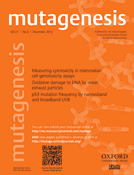
MUTAGENESIS
metrics 2024
Unraveling the complexities of genetics and toxicology.
Introduction
MUTAGENESIS, published by Oxford University Press, is a leading journal in the fields of genetics, toxicology, and health, dedicated to advancing our understanding of mutagenic processes and their implications for human health. With an ISSN of 0267-8357 and an E-ISSN of 1464-3804, this journal has been at the forefront of mutagenesis research since its inception in 1986 and will continue to publish cutting-edge studies until 2024. Holding an impressive position in the academic community, MUTAGENESIS is ranked Q2 in Genetics, Q2 in Clinical Genetics, Q2 in Health, Toxicology, and Mutagenesis, and Q1 in Toxicology, reflecting its commitment to high-quality scholarly work. The journal enjoys a robust global readership, with significant rankings in various Scopus categories, including top positions in Environmental Science and Clinical Genetics, ensuring that it remains a vital resource for researchers, professionals, and students alike. While access to its articles is not completely open, MUTAGENESIS provides valuable insights that fuel innovative research and drive forward the understanding of genetic risks and toxicological assessments.
Metrics 2024
 0.86
0.86 2.50
2.50 2.60
2.60 102
102Metrics History
Rank 2024
Scopus
IF (Web Of Science)
JCI (Web Of Science)
Quartile History
Similar Journals

INTERNATIONAL JOURNAL OF HUMAN GENETICS
Advancing the Frontiers of Human GeneticsINTERNATIONAL JOURNAL OF HUMAN GENETICS is a distinguished publication dedicated to advancing knowledge in the fields of genetics and molecular biology. Published by KAMLA-RAJ ENTERPRISES, this journal explores critical developments and research findings from 2008 to 2016, though its coverage in Scopus has since been discontinued. With an ISSN of 0972-3757 and an E-ISSN of 2456-6330, the journal aimed to foster scholarly dialogue and serve as a resource for researchers, professionals, and students engaged in human genetics. While the journal holds a modest ranking in categories such as Biochemistry and Genetics, it remains a vital source for exploring niche topics within the realm of human genetics. Researchers interested in genetic screening, gene therapy, and clinical genetics will find valuable insights herein. Despite its pause in indexing, the journal continues to contribute to the academic discourse by disseminating critical research that bridges gaps in understanding human genetics.
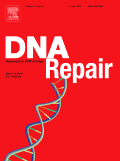
DNA REPAIR
Unraveling the Secrets of Cellular ResilienceDNA Repair, published by Elsevier, is a leading journal in the fields of biochemistry, cell biology, and molecular biology, presenting cutting-edge research since its inception in 2002. With an impressive Q1 ranking across its categories in 2023, the journal stands out in the top quartile of its field, reflecting its significant impact and relevance in the scientific community. The journal focuses on the intricate mechanisms of DNA repair processes, essential for understanding cellular responses to DNA damage and the implications for diseases such as cancer. Researchers, professionals, and students will find DNA Repair an invaluable resource, offering open-access options for wider dissemination of knowledge, while its strong Scopus rankings underline its contribution to advancing the understanding of molecular interactions and biochemistry. Located in the heart of the Netherlands, the journal continues to be at the forefront of scientific discovery, promoting the exploration of DNA dynamics and the innovations arising from this critical area of study.

Gene Reports
Bridging Research and Application in GeneticsGene Reports is a prominent academic journal published by Elsevier that focuses on the rapidly evolving field of genetics. Launched in 2015, this journal serves as a pivotal platform for the dissemination of cutting-edge research, bridging the gap between basic and applied genetics studies. Although it currently holds a Q4 ranking in the Genetics category and stands at the 248th position out of 347 in Scopus rankings, its potential for growth is significant given the increasing interest in genetic research across various disciplines. With an E-ISSN of 2452-0144, Gene Reports aims to provide open access to original research articles, reviews, and short communications that advance the collective understanding of genetic mechanisms and their applications. As a publication that continues to shape the future of genetics, it is an essential resource for researchers, professionals, and students seeking to stay informed about the latest developments in this crucial field.

RUSSIAN JOURNAL OF GENETICS
Connecting Researchers through Genetic InnovationsRUSSIAN JOURNAL OF GENETICS is a significant platform in the field of genetics, published by PLEIADES PUBLISHING INC since its inception in 1996. With an ISSN of 1022-7954 and an E-ISSN of 1608-3369, the journal focuses on a wide array of topics within genetics, providing researchers, professionals, and students with insights into advancements and discoveries in this ever-evolving discipline. While it currently holds a Q4 ranking in the 2023 Genetics category according to Scopus, representing invaluable opportunities for knowledge dissemination, the journal is actively working to enhance its impact in future rankings. Readers will find the journal a repository of diverse genetic research findings, methodologies, and theoretical advancements. Although it is not an open-access journal, it is committed to serving the academic community through rigorous peer-reviewed articles. With a consistent publication trajectory spanning to 2024, the RUSSIAN JOURNAL OF GENETICS remains a crucial resource for those aspiring to stay at the forefront of genetic research and applications.
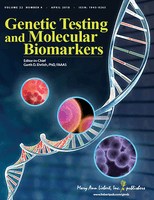
Genetic Testing and Molecular Biomarkers
Pioneering Discoveries in Genetic Testing and Biomarker Innovation.Genetic Testing and Molecular Biomarkers, an esteemed journal published by MARY ANN LIEBERT, INC, serves as a pivotal platform for advancing the field of genetic research and its applications in medicine. Focused on the innovative intersections of genetics and biomarker discovery, this journal has consistently contributed meaningful insights since its inception in 2009, with its scope evolving through 2024. With an ISSN of 1945-0265 and an E-ISSN of 1945-0257, it offers both traditional and open access options to cater to a broad audience of researchers, professionals, and students. Despite its current classification in the Q4 and Q3 quartiles for Genetics (clinical) and Medicine (miscellaneous) respectively, the journal remains committed to publishing high-quality, peer-reviewed articles that push the boundaries of knowledge in the field. As the landscape of genomic medicine continues to expand, Genetic Testing and Molecular Biomarkers is positioned as a crucial resource for disseminating cutting-edge discoveries and fostering interdisciplinary collaboration.

Toxicological Research
Innovating research to unveil the mysteries of toxicology.Toxicological Research is a prominent academic journal dedicated to advancing the field of toxicology through rigorous exploration and innovative research. Published by the Korean Society of Toxicology, this journal serves as a vital resource for researchers, professionals, and students engaged in environmental science, pharmacology, and toxicology. With an ISSN of 1976-8257 and an E-ISSN of 2234-2753, Toxicological Research highlights significant findings and discussions in the realm of health, toxicology, and mutagenesis. Although not an open-access journal, it maintains a solid reputation as evidenced by its Q3 ranking in both health-related toxicology and general toxicology categories for 2023. The journal covers a broad spectrum of topics from fundamental research to applied toxicology and provides a unique platform for the dissemination of knowledge in a field that is increasingly relevant in today’s society. With an anticipated convergence period from 2008 to 2024, Toxicological Research continues to contribute vital insights to understanding the implications of toxic substances on health and the environment.
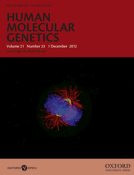
HUMAN MOLECULAR GENETICS
Charting new territories in clinical genetics.HUMAN MOLECULAR GENETICS, published by Oxford University Press, is a premier journal in the field of genetics, with an established reputation since its inception in 1992. With an impressive Q1 ranking in various categories, including Genetics, Clinical Genetics, and Molecular Biology, this journal engages a diverse readership by reporting significant advances in our understanding of the genetic basis of human health and disease. The journal has achieved notable rankings within Scopus, particularly in Clinical Genetics, making it a key resource for professionals and researchers aiming to stay at the forefront of genetic research. Although it operates under a traditional access model, it remains committed to disseminating high-quality research that informs clinical practice and enhances knowledge in the genetic field. The journal's impact factor signifies its crucial role in shaping contemporary genetic research and its application in medicine. As the field continues to evolve, HUMAN MOLECULAR GENETICS serves not only as an academic repository but also as a vital platform for innovation and discussion among students, researchers, and clinicians.

Molecular & Cellular Toxicology
Connecting molecular insights to public health challenges.Molecular & Cellular Toxicology, published by the Korean Society Toxicogenomics & Toxicoproteomics (KSTT), is a significant journal in the field of toxicology, providing crucial insights into molecular mechanisms underlying toxic responses. With an ISSN of 1738-642X and E-ISSN 2092-8467, this journal serves as a vital platform for researchers, professionals, and students interested in the latest findings and advancements in toxicology, health, and environmental science. Although it operates under a subscription model, it maintains rigorous peer review standards, contributing to its respectable Q3 classification in Health, Toxicology and Mutagenesis, and its Q2 standing in Pharmacology, Toxicology, and Pharmaceutics. The journal, intersecting with innovative aspects of pharmacology and public health, aims to foster a deeper understanding of toxicological impacts on cellular processes and overall health. Located in Germany and supported by a dedicated editorial board, Molecular & Cellular Toxicology stands out in the academic community, encouraging interdisciplinary discourse and collaboration to address critical toxicological challenges. Engage with us for cutting-edge research that informs and shapes the future of toxicological science.
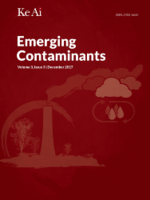
Emerging Contaminants
Navigating the complexities of emerging pollutants.Emerging Contaminants is a leading international journal dedicated to the exploration and analysis of novel pollutants, their effects, and the methodologies for their detection and remediation. Published by KEAI PUBLISHING LTD in China, this Open Access journal has been at the forefront of scientific discourse since its inception in 2015, allowing unrestricted access to cutting-edge research. With an impressive categorization in the top Q1 quartile across diverse fields, including Health, Toxicology and Mutagenesis, and Public Health, it ranks remarkably high—41st out of 665 in Public Health and 10th out of 133 in Toxicology according to Scopus metrics, demonstrating its vital role in advancing our understanding of environmental health risks. By bridging the gap between academia and practical applications, Emerging Contaminants not only enriches the scientific community but also serves as an essential resource for policymakers and industry leaders seeking effective solutions to environmental challenges. Researchers, professionals, and students alike are encouraged to engage with the journal’s comprehensive studies and findings, contributing to a sustainable future.
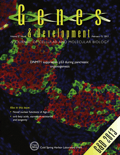
GENES & DEVELOPMENT
Innovating Research at the Intersection of Genes and DevelopmentGENES & DEVELOPMENT, published by COLD SPRING HARBOR LAB PRESS, stands as a premier journal in the fields of Developmental Biology and Genetics, boasting a remarkable impact factor that reflects its prestigious position in the academic community—ranking Q1 in both disciplines as of 2023. Since its inception in 1987, this journal has been at the forefront of disseminating cutting-edge research, effectively bridging the gap between laboratory breakthroughs and their applications in health and disease. Researchers and professionals rely on GENES & DEVELOPMENT for its rigorous peer-review process and its commitment to promoting innovative studies that unravel the complexities of gene functions and developmental processes. With Scopus rankings placing it in the top percentile among its peers, this journal serves as a vital resource for students and established scientists alike, aspiring to expand their knowledge and contribute to the ever-evolving landscape of genetic and developmental research.